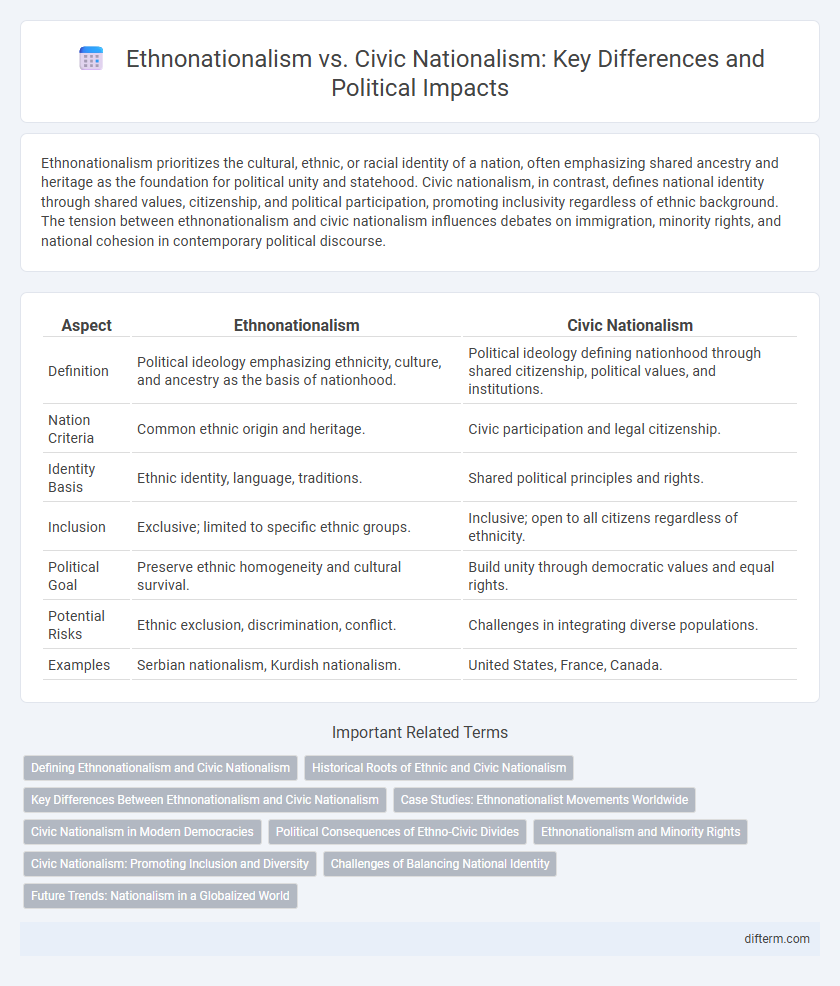Ethnonationalism prioritizes the cultural, ethnic, or racial identity of a nation, often emphasizing shared ancestry and heritage as the foundation for political unity and statehood. Civic nationalism, in contrast, defines national identity through shared values, citizenship, and political participation, promoting inclusivity regardless of ethnic background. The tension between ethnonationalism and civic nationalism influences debates on immigration, minority rights, and national cohesion in contemporary political discourse.
Table of Comparison
| Aspect | Ethnonationalism | Civic Nationalism |
|---|---|---|
| Definition | Political ideology emphasizing ethnicity, culture, and ancestry as the basis of nationhood. | Political ideology defining nationhood through shared citizenship, political values, and institutions. |
| Nation Criteria | Common ethnic origin and heritage. | Civic participation and legal citizenship. |
| Identity Basis | Ethnic identity, language, traditions. | Shared political principles and rights. |
| Inclusion | Exclusive; limited to specific ethnic groups. | Inclusive; open to all citizens regardless of ethnicity. |
| Political Goal | Preserve ethnic homogeneity and cultural survival. | Build unity through democratic values and equal rights. |
| Potential Risks | Ethnic exclusion, discrimination, conflict. | Challenges in integrating diverse populations. |
| Examples | Serbian nationalism, Kurdish nationalism. | United States, France, Canada. |
Defining Ethnonationalism and Civic Nationalism
Ethnonationalism centers on shared heritage, culture, language, and ancestry as the basis for political unity, emphasizing the distinct identity of a particular ethnic group within a nation-state. Civic nationalism prioritizes inclusive citizenship, commitment to political institutions, and shared values over ethnic or cultural homogeneity, promoting national unity through common legal and political frameworks. The contrasting foundations of ethnonationalism and civic nationalism influence state policies, minority rights, and national identity construction in diverse political contexts.
Historical Roots of Ethnic and Civic Nationalism
Ethnonationalism traces its historical roots to the emergence of ethnic groups seeking political sovereignty based on shared ancestry, language, and cultural traditions, often solidified during periods of state formation in 19th-century Europe. Civic nationalism, by contrast, originated in the Enlightenment and revolutionary eras, emphasizing political membership defined by shared citizenship, legal equality, and adherence to common political values rather than ethnic identity. The French Revolution marked a pivotal moment for civic nationalism, promoting inclusive national unity grounded in citizenship rather than ethnic lineage.
Key Differences Between Ethnonationalism and Civic Nationalism
Ethnonationalism emphasizes shared heritage, culture, language, and often ethnicity as the foundation of national identity, while civic nationalism is rooted in shared citizenship, political rights, and allegiance to established institutions regardless of ethnic background. Ethnonationalism frequently promotes exclusivity and homogeneity, contrasting with civic nationalism's inclusive approach that values diversity within a common legal and political framework. Governments leaning toward ethnonationalism may prioritize ethnic customs in lawmaking, whereas civic nationalist regimes focus on constitutional values and equal participation.
Case Studies: Ethnonationalist Movements Worldwide
Ethnonationalist movements such as the Kurdish struggle for autonomy in Iraq, the Catalan independence push in Spain, and the Tamil separatist conflict in Sri Lanka illustrate the emphasis on shared ethnicity, language, and cultural heritage as a basis for political legitimacy. These case studies highlight how ethnonationalism often fuels demands for self-determination, challenging the civic nationalist ideal of inclusive citizenship based on shared political values. The persistence of ethnonationalist sentiments in multi-ethnic states underscores tensions between ethnic identity and state sovereignty in global politics.
Civic Nationalism in Modern Democracies
Civic nationalism in modern democracies emphasizes shared values, political rights, and inclusive citizenship regardless of ethnic or cultural origins, fostering unity through allegiance to democratic institutions and constitutional principles. It supports pluralism and equal participation, reinforcing social cohesion by promoting common identity based on civic participation and respect for human rights. Contemporary examples include liberal democracies like Canada and Germany, where civic nationalism underpins policies on immigration and integration, ensuring national belonging is tied to commitment to democratic governance rather than ethnicity.
Political Consequences of Ethno-Civic Divides
Ethnonationalism often leads to exclusionary policies that prioritize a dominant ethnic group, increasing the risk of ethnic conflicts and social fragmentation within states. Civic nationalism promotes inclusive citizenship based on shared political values, which can enhance social cohesion but may face challenges in contexts with strong ethnic identities. The political consequences of these divides frequently manifest in legislative gridlock, identity-based mobilization, and varying levels of state stability.
Ethnonationalism and Minority Rights
Ethnonationalism prioritizes the interests and cultural identity of a dominant ethnic group, often leading to the marginalization of minority communities and erosion of their rights. This form of nationalism can exacerbate ethnic tensions and hinder inclusive policy-making, resulting in systemic discrimination against minorities. Protecting minority rights in ethnonationalist states requires robust legal frameworks and international oversight to prevent exclusion and promote equitable representation.
Civic Nationalism: Promoting Inclusion and Diversity
Civic nationalism emphasizes shared citizenship and political participation as the foundation for national identity, promoting inclusion and diversity beyond ethnic or cultural origins. This form of nationalism supports equal rights and representation for all members of society, fostering social cohesion in multicultural democracies. By valuing individual freedoms and pluralism, civic nationalism counters ethnonationalist exclusion and ethnic homogeneity.
Challenges of Balancing National Identity
Balancing national identity between ethnonationalism and civic nationalism presents challenges in preserving cultural heritage while promoting inclusivity across diverse populations. Ethnonationalism emphasizes shared ancestry and traditions, risking exclusion and social fragmentation in multicultural societies. Civic nationalism focuses on common citizenship and political values, often demanding policies that reconcile historical identities with contemporary pluralism.
Future Trends: Nationalism in a Globalized World
Ethnonationalism and civic nationalism are evolving amid growing globalization, where ethnonationalism emphasizes shared heritage and cultural identity while civic nationalism promotes inclusive citizenship based on legal frameworks and common values. Future trends indicate a complex interaction as global migration and digital connectivity challenge ethnonationalist boundaries, often fueling identity politics and resistance. Civic nationalism's adaptability to multicultural societies offers a potential pathway to mitigate ethnic tensions and foster social cohesion in increasingly interconnected nations.
ethnonationalism vs civic nationalism Infographic

 difterm.com
difterm.com